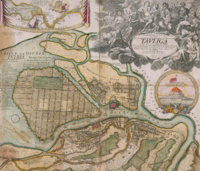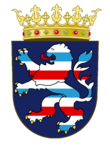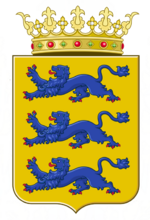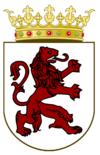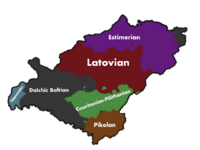Transbaltia
Grand Duchy of Transbaltia | |
|---|---|
 | |
| Capital | Tavliga |
| Official languages | Alemannish, Latovian, Estimerian, Pikolan, Pilithanian |
| Recognised regional languages | Pikolan |
| Ethnic groups | Dolchic Baltians 31% Couritanians 20% Latovians 19% Pilithanians 14% Pikolan 11% Ahranians 2% |
| Government | Semi-Constitutional Monarchy under a Grand Duke |
| Otto IV | |
• Chancellor | Albert von Ostland |
| Legislature | Parliament |
| Federal Council | |
| Federal Assembly | |
| Independence from Ahrana | |
• Kingdom of the Baltians proclaimed | 1307 |
• Ahranian vassalisations | 1507 |
• Grand Duchy created | 1565 |
• Independence from Ahrana | 1912 |
• Establishment of the Socialist Federation | 1948 |
• Collapse of the federation | 1992 |
| Area | |
• Total | 229,900 km2 (88,800 sq mi) |
| Population | |
• 2020 estimate | 16,450,000 |
• Density | 71/km2 (183.9/sq mi) |
| GDP (nominal) | 2020 estimate |
• Total | 329,000,000,000 (25th) |
• Per capita | 20,000 (23rd) |
| Currency | Baltian Thaler (BTA) |
Transbaltia, or formally the Grand Duchy of Transbaltia, is a country located in mid Argis, in the Argic Great Lakes region, bordering Uppsund to the west, Estimeria to the north and Dazhdinia and Littland to the east. Transbaltia is located on the Intrian Sea. It has a population of 16.4 million Transbaltians, with a population density of 71 people per square kilometer. Transbaltia's capital and largest city is Tavliga.
Transbaltia is a Constitutional Monarchy, led by a hereditary Grand Duke, the Chancellor of Transbaltia, who is elected from the Federal Assembly to serve at the Grand Dukes pleasure. Transbaltia gained independence from Ahrana in 1912, after several centuries of Ahranian subjugation which followed Ahranian vassalisations of shattered Baltian duchies. For near half the 20th century Transbaltia was under a communist dictatorship, born out of a 1948 coup, which eventually collapsed in 1992, allowing the restoration of the government in exile and an age of prosperity in the nation. The current head of state is Grand Duke Otto IV, who has reigned since 1998.
Transbaltia's economy is largely agricultural across the majority of the nation, though with oil and mineral extraction in certain regions also providing a large amount of the country's economic output. In urban and coastal regions the economy is largely service based, with expanding financial and information technology sectors. Transbaltia maintains good relations with its neighbours, and is a member of the Inner Sea Organisation.
History
Prehistory
Middle Ages
By 1304 the counties that make up Transbaltia were prosperous, trading with nearby kingdoms and the advent of new shipping technologies allowed communication and trade across Argis. In that year the Count of the inland County of Meußen, Albrecht the Unifier, proclaimed the Duchy of Ostland, the first of the Transbaltian duchies. Quickly he conquered all the way to the coast, benefiting heavily from the increased trade across the Intrian sea. Albrecht would quickly conquer the rest of Transbaltia, making it all the way to Pikolan. He then formed the Kingdom of the Baltians, but this was not to last forever.
Over the next two centuries, the Kingdom suffered from famines and incursions by neighbours. However, in 1464 the young King Adelvard was crowned. Adelvard was seen as a great unifier of the differing cultures of the Kingdom. He soon won wars against neighbours in Dazhdinia, reclaiming Pikolan for the Baltian crown. Adelvard had 6 children, 4 sons to which he granted Duchies in his will, and two daughters. One daughter, Hilda, was married to the Ahranian heir to the throne, and later mothered the future king of Ahrana, and the other Christina, who was married to Prince Bertulis of the Kingdom of Yalivia. Against the advice of his sons, Adelvard also granted Prince Bertulis the Duchy of Pikolan, as long as it remained a part of the Kingdom for as long as the Kingdom may exist. Adelvard died in 1498, granting the title of King to his eldest son, Harald. Harald was unpopular among his siblings, as he demanded they pay large taxes to the crown, to finance his failing attempts to settle further inland. In 1500 the brothers decided to stage a coup against the King, and place the second-eldest Eric in his place. The coup failed, and Harald attempted to revoke his brothers' duchies. This failed and led to wars of independence against the Baltian crown. By 1504 the Kingdom was dissolved, and the 5 duchies that once made up the Kingdom were independent and weakened.
Ahranian Era
In 1507 the new Kingdom of Ahrana gained control over the now fractured duchies, this was brought about by the Ahranian King's mother, Hilda, daughter of Adelvard, which gave the Ahranian King a claim to the Baltian lands. The King gained control of these lands through careful diplomacy and threats against those who didn't give in. The Duke of Pikolan, realising that he was next to be forced into Ahranian control, swore fealty to his homeland of Yalivia, however the Yalivian King was afraid of an Ahranian invasion and declined him. Soon after Pikolan too fell to the Ahranian crown, and without a single war declared, Transbaltia was again under a single flag. The Dukes were initially sceptical of Ahranian rule, however soon would grown to be pleased by the protection and economic support that the Kingdom provided.
Later in the 1400s and throughout the 1500s numerous Dolchic nobles intermarried with the Baltian nobility, so much so to the extent that a new ethnic and cultural group, now known as Dolchic Baltians, was created. Dolchic Baltians soon gained large amounts of power, eventually with every Transbaltian duke being a Dolchic Baltian by 1540. Still today, the country is dominated politically and economically by Dolchic Baltians, though they make up less than half the population.
In 1564 the Transbaltian duchies came under the Principality of Uppsund, which was created by King Alexander II of Ahrana for his son. The Dukes were sceptical of this, having been directly beneath the King meant that a smaller proportion of their income was paid in taxes, but would now have to pay the Prince of Uppsund too. This created a rift between the Prince of Uppsund and the Baltian dukes, who also felt that their guarantee of the preservation of Baltian cultures, guaranteed by the King, would also come under threat. To ease these concerns, the Prince of Uppsund created the Grand Duchy of Transbaltia, containing all the former Baltian duchies except for Pikolan. The title of Grand Duke was initially offered to Duke Otto of Ostland, but because of his declining health and uncertain inheritance, he declined the offer and instead suggested Duke Karl of Cisvilia. Karl was called to the court of the Prince of Uppsund in November 1565, and was crowned the Grand Duke over the next few days, with his now adult son Friedrich to be heir. Unfortunately on his return to Transbaltia from Uppsund Karl contracted pneumonia from the winter cold and died within a week. Friedrich, having been heir to a throne that existed for less than a month, was crowned Grand Duke in Tavliga.
Friedrich quickly went about organising his new realm, granting positions in his court and establishing the beginnings of a navy to crack down on piracy in the Intrian sea. Friedrich would marry the daughter of the King of [Dolchic Kingdom], solidifying his family's place in Dolchic nobility. Friedrich would go on to expand Transbaltia's borders northward, the land north of the duchies was sparsely populated, and no real nation had laid claim to the lands in centuries. Friedrich jumped at the chance, hoping to extend Transbaltia to the northern lakes. By 1579 he had done just that, and he established settlements along the newly claimed coast, the most notable being Konigshafen, which would grow to be the Grand Duchy's third-largest city. He also embarked on a task to construct a large system of roads and canals across Transbaltia, he succeeded with his road construction, connecting Tavliga to Konigshafen by 1585 in part thanks to loans he took from the Ahranian crown, but his ambition to connect the Intrian sea and the northern lakes via a canal connecting two of the nation's largest rivers was never completed in his lifetime, as he was killed in battle in 1582 during a border conflict near Dazhdinia.
In 1624 Hermann I was crowned Grand Duke, the grandson of Friedrich, he was also the grandson of the immensely wealthy Dolchlander Hans von Shipph. Von Shipph was one of the wealthiest individuals in history, doing business across continents, and influencing international politics throughout his lifetime. In 1615 when von Shipph died he left an immense sum to all of his grandchildren, but an especially large sum to his grandson Hermann, who had been his apprentice in the final years of his life. In the port cities of Argis Hermann would look upon his grandfather as he negotiated with Kings and merchants alike, this gave the young Hermann a taste for business which he would use during his reign to bring great wealth to cities such as Tavliga and Konigshafen. Hermann would travel the world during his reign, establishing a merchant navy to trade everything from Ice to spices. Hermann succeeded in fulfilling his other grandfather's dream of building a canal connecting the Intrian and the northern lakes, however it could only support river barges, and whilst for the time that was sufficient for the amount of trade, as demand increased so did the size of ships transporting goods, which quickly outgrew the canal.
Hermann was a notorious spender, though he was careful not to put the Grand Duchy into debt, he would still draw criticism from court rivals and the people alike. Hermann constructed more than a dozen palaces across the Grand Duchy, in which he would host parties for nobles and the wealthy from across the continent and beyond, quickly the city of Tavliga was abounded by peoples from around the world, Emirs would live across from Argic princes, the palace kitchens were filled with foreign chefs and new foods and spices brought by Hermann's extensive trading network. Hermann was also noted for his relationships with men, which remained an open secret in the Royal Court. Hermann's extravagance, excessive spending and way of life that went against some of the more conservative nobles' beliefs lead ultimately to his assassination in 1638. The Grand Duke was shot by the Lieutenant of the 1st Ostland Cavalry Regiment in his carriage, along with his lover Gustav of Couritania and his wife Grand Duchess Maria, who survived the attack and four months later gave birth to Hermann's only son Ernst. The infant would rule by a regency council, headed by his uncle Stefan, the Governor General of Konigshafen. Stefan was loyal to the young Grand Duke, and upon his 18th birthday he relinquished his authority, but returned as the first Kanzler.
Self governance and personal union
In 1772, Augustus, Duke of the Duchy of Runesburg and Consort of Transbaltia, died, leaving his possesions to his only son, Wilhelm, later Grand Duke Wilhelm I. This caused a crisis in Transbaltia and Runesburg, with many on both sides arguing against the Grand Duke bearing both titles. Wilhelm however chose not to concede the lands of his fathers dynasty, and after long discussions with the Ahranian and Dolchic monarchs, an agreement was reached, in which Transbaltia and Runesburg would function as seperate entities, with near nothing in common but a shared monarch, who was bound to ensure that his will in one domain would be independent to that of the other. This agreement was formalised in the 1774 Treaty of Hof Matensburg.
The Treaty would come under strain however, when Wilhelm pushed to enter the War of the Habstrian Succession in 1795. During the war Runesburg suffered heavy casualties, and didnt have enough manpower to replenish its armies. Therefore Wilhelm called upon his standing army in Transbaltia, a skilled and professional army, to face Habstrian forces in Dolchland. This lead to Emperor Heinrich, the King of Habstria and leader of the opposing forces, to call upon the Imperial Diet, and attempt to dethrone Wilhelm from his position of Elector, and install Joachim of $state as the duke, however after the war, and Heinrich's overthrow, the issue was resolved by Emperor Francis, allowing Wilhelm to retain his title, and even upgrade his duchy to an electorate by Imperial decree in 1797.
Independence from Ahrana
In 1911 the nationalists took power in Ahrana, and within a year they abolished the monarchy and established an authoritarian regime, labelled a republic. This caused widespread panic across all of the states of Ahrana, leading to the independence of many of its states such as Elde and Uppsund. The newly nationalist Ahranian army maintained a military presence in Transbaltia, designed to protect its eastern borders, it would now be used to take control of dissenting regions. The 4th and 7th Ahranian Infantry corps were stationed near to the Dazhdidnian border, led by Generals Aleksander Tuschkov and Pietro Zuchevski respectively. Zuchevski was a staunch supporter of the nationalist cause, and upon hearing of Elde and Uppsund's declerations of independence he decided to march the 7th Infantry corps to Tavliga to dissuade any attempts of secession. Tuschkov on the other hand was born in Ostland, and was loyal to the Ahranian crown, and initially warned several royal ministers and generals of a nationalist coup. Tuschkov upon hearing of Zuchevski's plans also moved to position his army in Tavliga, where he would join forces with the Tranbaltian army and marine brigades.
Though before either army could arrive in Tavliga, Grand Duke Friedrich III signed the Transbaltian Decleration of Independence, revoking any ties or obligations of Transbaltia to Ahrana, and establishing it as an independent state. Though General Tuschkov initially hoped that Transbaltia would remain in Ahranian hands, he feared the nationalists to be the greater of two evils, and pledged to support their independence from the nationalist regime.
Celebrations began in Tavliga following the decrlaration, but when news spread of the approaching Ahranian army panic insued, the newly independent government estimated that they had a week before the 7th army arrived and began preperations for the evacuation and defence of the city. The Transbaltian garrison in Tavliga had already made contact with Tuschkov, however the 4th army would arrive in the city after Zuchevski's. Overnight thousands of people fled the capital, along with hundreds of paintings and valubles from Tavliga's palaces. Within five days near only the garrison remained in the city, guarding the city's forts and patroling the medieval city walls. The 7th army arrived in the early morning of August 19th, and began bombarding the city with towed artillery.
Within hours much of the city's outskirts were devastated, however by midday, the 4th corps unexpectedly arrived catching Zuchevski off guard, what insued was a blood bath, with Tavligan and loyal Ahranians destroying the nationalist army within days. Zuchevski was later captured by Transbaltian forces in Ostland however he escaped, and eventually made his way back to Ahrana. The 19th of August is remembered as defiance day, and is celebrated anually.
All of Transbaltia's states ratified the Declaration of independence but one, the Duchy of Pikolan. The Duchy had long sought independence from Transbaltia, and to be made an individual state of Ahrana. However after the rise of the nationalists and Transbaltian independence, the Duke of Pikolan decided to take matters into his own hands, and a month after the Transbaltian declaration, he also declared an independent Duchy of Pikolan. The Duchy would initially face success, with Transbaltia recognising it as independent of its rule (Though they considered it within their sphere of influence), and an expansive economy. This wasnt to last long though, as its eastern neighbour Dazhdinia sought to expand its Intrian coastline. In $YEAR Dazhdin troops marched into Pikolan and within nearly a month completely controlled the state, incorporating it into the Yalivian republic.
Protectorate of Uppsund
Following the Dazhdin annexation of Pikolan, Transbaltia was worried of further Dazhdin conquests in Transbaltia. This led to a 14 year period in which Transbaltia was a protectorate of the Kingdom of Uppsund. The Treaty of Kaurtsburg outlined that in return for the protection of Transbaltian lands, Uppsund would gain considerable control over Transbaltian foreign, military and economic policy.
Socialist Federation
In early 1947 a group of communist components of the military began plotting to overthrow the government and establish a socialist state in its place. Communism had posed a threat to Transbaltia for decades, with the socialist Dazhdinia to the south east and an increasingly large communist party. Despite this the conspirators didnt have sufficient manpower to seize control until October of that year, when they made contact with the Dazhdin government.
The socialist cause was most popular among ethnic native baltians, who played a significantly less prominant role compared to the Dolchic Baltians, who dominated Transbaltia economically and politically. Though reforms were underway to allow greater power to the native baltians, dissent remained and in 1948 armed protests began.
Colonel Nicolai Kaibo, an ethnic Estemerian, was the leader of the communist cause in the military, and after armed protests began across the country, seized power in Tavliga, and forced the royal family and government into exile.
Collapse of the Socialists
Modern day
Geography
Climate
Environment
Politics and government
Transbaltia is made up of 4 Duchies, each with their own Duke, and 2 Governates. The Duke of Cisvilia has acted as the Grand Duke since the founding of the Grand Duchy in 1565. The current Grand Duke, Otto IV, was crowned in 1998 after the death of his mother Grand Duchess Theresa I.
Transbaltia has a Parliamentary System similar to the one used in the United Kingdom of Ahrana with the Grand Duke as the Head of State and the Chancellor as the Head of Government. The Chancellor is elected from the Federal Assembly to the Office of Chancellor to serve an unfixed term, which is granted at the pleasure of the Grand Duke or a vote of no confidence in the Parliament.
Executive
Grand Duke/Duchess
The Executive Government is headed by the Grand Duke or Grand Duchess as the Head of State of the Grand Duchy. The Grand Duke/Duchess has ceremonial powers granted to the office by the written constitution and the individual acts that also make up the other part of the Constitution. The Head of State receives all diplomatic visitors and Ambassadors on behalf of the Transbaltian People, is the ceremonial head of the Armed Forces of Transbaltia, signs all laws from the Parliament with a reserve power of veto in some cases, and can dissolve parliament and the government we desired or needed.
Chancellor
The Chancellor of Transbaltia is the Head of Government who is elected from amongst the Transbaltian Parliament.
Military
Transbaltia maintains a relatively small military of 38,000 active and 29,000 reserve servicemen and women. The first forms of a Transbaltian military came about in 1566 in the form of a navy to crack down on piracy in the Intrian Sea. The first ships built have all since been destroyed, however the pride of the fleet the Ostland, built for the Admiral and Duke of Ostland in 1620, is still maintained in the harbour of Kaurtburg. Since independence Transbaltia has formed a decent naval force for a nation of its size, however it rarely faces threats, and it is uncommon for vessels to leave the Intrian Sea. Despite this, recently Transbaltic ships have been used in anti-piracy operations around Argis.
The army is the largest of the three branches of the military in terms of manpower. There are 25 regiments of the Royal Transbaltian Army, and 4 more are currently being formed as a part of the Transbaltian expansion of the armed forces. Transbaltia also maintains a small air force, based out of three air bases across the country, however it is rarely mobilised.
Each branch of the armed forces contains a Special Services Divion, or Sonderdienstleistungen. These divisions are the elite special forces of the nation, and are used for counter-insurgency, counter-terrorism, law enforcement and in some cases also espionage. They are directed by the General Special Services Headquarters in Konigshafen, and led by General Ernst Kalikov. The armed forces in whole are lead by Marshall-General, or Generalmarschall, Hans von Bertricht, from the Armeekommentariat building in Tavliga, and the Ahrenhafen Admiralty building near Kaurtsburg.
Foreign relations
Administrative Divisions
| Duchy of Cisvilia | Duchy of Ostland | Duchy of Couritania | Duchy of Latovia |
|---|---|---|---|
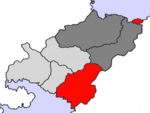 |
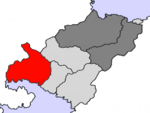 |
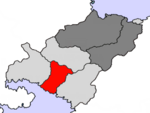 |
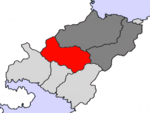
|
| Tavliga | Kaurtsburg | Jakobstadt | Mantius |
| Otto IV | Heinrich III | Catherine II | Erwin I |
| Example | Example | Example | Example |
| Example | Example | Example | Example |





